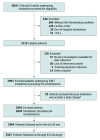Intubation Practices and Adverse Peri-intubation Events in Critically Ill Patients From 29 Countries
- PMID: 33755076
- PMCID: PMC7988368
- DOI: 10.1001/jama.2021.1727
Intubation Practices and Adverse Peri-intubation Events in Critically Ill Patients From 29 Countries
Erratum in
-
Addition of Nonauthor Collaborator Names of the INTUBE Study Collaborators.JAMA. 2021 Jun 22;325(24):2507. doi: 10.1001/jama.2021.9012. JAMA. 2021. PMID: 34028510 Free PMC article. No abstract available.
Abstract
Importance: Tracheal intubation is one of the most commonly performed and high-risk interventions in critically ill patients. Limited information is available on adverse peri-intubation events.
Objective: To evaluate the incidence and nature of adverse peri-intubation events and to assess current practice of intubation in critically ill patients.
Design, setting, and participants: The International Observational Study to Understand the Impact and Best Practices of Airway Management in Critically Ill Patients (INTUBE) study was an international, multicenter, prospective cohort study involving consecutive critically ill patients undergoing tracheal intubation in the intensive care units (ICUs), emergency departments, and wards, from October 1, 2018, to July 31, 2019 (August 28, 2019, was the final follow-up) in a convenience sample of 197 sites from 29 countries across 5 continents.
Exposures: Tracheal intubation.
Main outcomes and measures: The primary outcome was the incidence of major adverse peri-intubation events defined as at least 1 of the following events occurring within 30 minutes from the start of the intubation procedure: cardiovascular instability (either: systolic pressure <65 mm Hg at least once, <90 mm Hg for >30 minutes, new or increase need of vasopressors or fluid bolus >15 mL/kg), severe hypoxemia (peripheral oxygen saturation <80%) or cardiac arrest. The secondary outcomes included intensive care unit mortality.
Results: Of 3659 patients screened, 2964 (median age, 63 years; interquartile range [IQR], 49-74 years; 62.6% men) from 197 sites across 5 continents were included. The main reason for intubation was respiratory failure in 52.3% of patients, followed by neurological impairment in 30.5%, and cardiovascular instability in 9.4%. Primary outcome data were available for all patients. Among the study patients, 45.2% experienced at least 1 major adverse peri-intubation event. The predominant event was cardiovascular instability, observed in 42.6% of all patients undergoing emergency intubation, followed by severe hypoxemia (9.3%) and cardiac arrest (3.1%). Overall ICU mortality was 32.8%.
Conclusions and relevance: In this observational study of intubation practices in critically ill patients from a convenience sample of 197 sites across 29 countries, major adverse peri-intubation events-in particular cardiovascular instability-were observed frequently.
Conflict of interest statement
Figures


Comment in
-
International Variation in Intubation and Extubation Practices and Adverse Events Among Critically Ill Patients Receiving Mechanical Ventilation.JAMA. 2021 Mar 23;325(12):1157-1159. doi: 10.1001/jama.2021.1178. JAMA. 2021. PMID: 33755055 No abstract available.
-
Proactive Approach to Peri-Induction Hemodynamic Management in Critically Ill Patients.J Cardiothorac Vasc Anesth. 2021 Dec;35(12):3489-3492. doi: 10.1053/j.jvca.2021.06.015. Epub 2021 Jun 18. J Cardiothorac Vasc Anesth. 2021. PMID: 34253443 No abstract available.
-
Intubation Practices and Adverse Peri-intubation Events in Critically Ill Patients.JAMA. 2021 Aug 10;326(6):568-569. doi: 10.1001/jama.2021.8529. JAMA. 2021. PMID: 34374725 No abstract available.
-
Intubation Practices and Adverse Peri-intubation Events in Critically Ill Patients.JAMA. 2021 Aug 10;326(6):568. doi: 10.1001/jama.2021.8526. JAMA. 2021. PMID: 34374726 No abstract available.
-
[Focus ventilation, oxygen therapy and weaning : Intensive medical care studies from 2020/2021].Anaesthesist. 2021 Nov;70(11):967-976. doi: 10.1007/s00101-021-00979-8. Epub 2021 Oct 6. Anaesthesist. 2021. PMID: 34613457 Free PMC article. German. No abstract available.
References
Publication types
MeSH terms
Substances
LinkOut - more resources
Full Text Sources
Other Literature Sources
Medical

